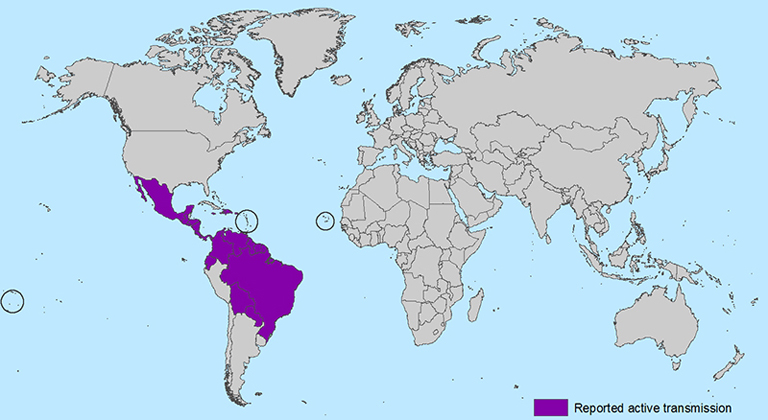
According to the Centers for Disease Control (CDC) (http://www.cdc.gov/zika/index.html), the Zika virus is a disease spread through mosquito bites, most commonly from a mosquito of the Aedes species. Recent studies have shown that some cases of the virus were transmitted from human-to-human contact.
2. Where did the virus originally come from?
According to the World Heath Organization (WHO) (http://www.who.int/emergencies/zika-virus/timeline/en/), scientists performing surveillance of yellow fever in the Zika forest of Uganda in 1947 found Zika virus samples in a sentinel rhesus monkey. The first human case wasn't documented until 1952 in Uganda and the United Republic of Tanzania.
3. What are the Zika virus symptoms?
Symptoms include fever, rash, joint pain and red eyes. They usually last for less than a week. Other symptoms include pain in the back of the eyes, joints or muscles. Fatigue, chills, loss of appetite, sweats, headaches and vomiting can also occur. In rare cases, patients have been found to develop Guillain-Barre syndrome, which causes mostly temporary paralysis.
Make sure to consult your physician for medical advice if you have any of these symptoms.
4. What are the treatments?
Treatments for the above symptoms are similar to those for the flu and include rest, medication to reduce fever and rehydration.
5. Where can you find active transmission of the Zika virus?
The Zika virus has been reported in Puerto Rico, the US Virgin Islands and American Samoa. Many countries in South America have reports of local mosquito-borne transmission of the disease. All 618 cases from the United States were travel-based, and not locally mosquito-borne. 
6. Zika virus and pregnancy: What do you need to know?
If a woman is infected with Zika virus, it can be spread to her fetus during pregnancy or labor. It is unknown what effect it would have on the pregnancy, how common it is to be transferred to the fetus, or whether an infected fetus will definitely develop birth defects. There are still many unknowns about Zika virus in that regard, but it has been linked to microcephaly and other brain defects in newborns. Other issues with infants that are affected by Zika virus are eye defects, growth defects and hearing loss.
7. What is microcephaly?
Microcephaly is when an infants’ head is smaller than average. Their brains are also smaller and might not develop correctly. Then there’s severe microcephaly, which is when the infant’s head is even smaller than it’s supposed to be, and smaller than regular microcephaly.
8. If you get the Zika virus, and want to have babies in the future, is there a risk of birth defects?
Although there is still much we don’t know about the Zika virus, current indications are that once the virus has cleared from the blood, you should not be at risk of giving birth to a baby with any birth defects.
9. How do you avoid getting bitten by an infected mosquito?
Since there are no infected mosquitos in the U.S. reported thus far, you should be safe, but it never hurts to be safe, especially since there are other well-established viruses transmitted by mosquito bites, such as West Nile. Use on-skin mosquito repellents including DEET, and cover up long-sleeved shirts and pants. Repellents such as those produced by Thermacell are quite effective at preventing bites, and are available as lanterns and torches as well as personal-sized units that you can clip to a belt or backpack. If you are leaving the U.S., do your research to see if the area might be infected, and take the proper precautions.






































